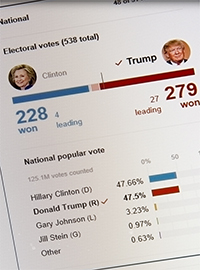| Why Democrats Fear the Electoral College |
 |
|
By David Harsanyi
Thursday, March 21 2019 |
The United States isn't a "democracy." Though every American should have learned this fact in high school civics class, the smart set still like to ridicule people who point it out — such a cliché and all. Today we see why the left has worked to convince Americans that majoritarianism is a profound moral good. And it's not just that the political class is going through another silly debate about the suddenly inconvenient Electoral College; it's that Democrats are increasingly comfortable attacking foundational ideas of American governance. Most of the Founding Fathers believed that a diffuse democracy would weaken the ability of politicians to scaremonger and rely on emotional appeals to take power. Most of them believed that proportional voting would blunt the vagaries of the electorate and help ensure national stability. Democrats agree, which is why they want to scrap the system. So much for protecting norms. Democrats prefer a system in which politicians who promise the most free stuff to the largest number of people win. Because they can't admit it, we have to wrestle with preposterous arguments in favor of overturning the Electoral College. The most absurd is the notion that in a direct democracy, every vote "counts." "My view is that every vote matters, and the way we can make that happen is that we can have national voting, and that means get rid of the Electoral College — and every vote counts," Sen. Elizabeth Warren said this week. It looks as if most Democratic Party presidential hopefuls are following her lead. Fact: We always "count" every vote, but "every vote" never counts. It might come as a surprise to many Americans that their losing ballots don't count in elections, which is why we disperse power in this country — to protect political and geographical minorities. As anyone who's looked at a history of electoral maps can see, the most closely fought-over states are always changing because the issues Americans care about are always changing. Today much of the divide is among urban, rural and suburban areas, making the Electoral College even more vital. "This is such a daft idea on its face," MSNBC's Chris Hayes wrote, reacting to Sen. Lindsey Graham's contention that calls for eliminating the Electoral College are meant to snuff out the political voice of rural Americans. "Every American already lives in a state that has both cities and rural areas. During statewide races, politicians campaign all over!" It's correct that politicians in statewide races tend to campaign everywhere. It is also true that in the end, it is urban areas that predominately elect Democrats, not rural ones. In direct national elections — with vast spaces to cover and limited time to campaign — candidates would be incentivized to rack up as many votes as they could in accessible urban areas with huge media markets. The Electoral College, imperfect as it is, forces candidates to moderate their views, create coalitions and appeal to voters in disparate areas. For example, we have the kind of system that might induce a Democratic presidential candidate to consider the voters of Wisconsin from her Brooklyn campaign headquarters. Some people like to point out that the Electoral College couldn't really be important, seeing as we've had only four elections in which it was in conflict with the "popular vote." The opposite is true. The Electoral College isn't about outcomes; it's about process. For instance, trying to delegitimize Donald Trump's 2016 victory by pointing to Hillary Clinton's "popular vote" victory is one of the most dishonest political arguments going — not merely because the "popular vote" is mythical and irrelevant but also because Trump ran a campaign focused on appealing to the Electoral College. If Republican presidential candidates concentrated their efforts on the huge untapped reserve of GOP voters in big states, the "popular vote" in 2016 would have looked very different. The problem is that we'd always have two candidates vying for voters in New York and California. "The idea that amending the Constitution — or simply proposing amendments — is somehow radical is a recent phenomenon and a silly one," Ryan Lizza of Esquire recently argued. "The 2016 Republican platform called for five constitutional amendments (abortion, same-sex marriage, term limits, balanced-budget, education)." What's truly silly is treating proposed constitutional amendments as if they were equally consequential. No, there's nothing particularly radical about partisans proposing additions that reflect their positions (a balanced budget amendment or an equal rights amendment). None of the ones the GOP has proposed fundamentally challenges one of the core ideas of our governing process. The idea of maintaining proportional voting and states' rights and decentralized power is not the same as an amendment dealing with bookkeeping. Now, it's unlikely Democrats will be successful in their efforts to change the Constitution. The problem is that their core notions about governance are increasingly conflicting with the Constitution in a number of vital ways. This is merely one example of many. David Harsanyi is a senior editor at The Federalist and the author of the book "First Freedom: A Ride Through America's Enduring History With the Gun." |
Related Articles : |
























